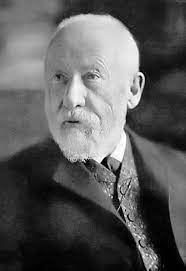Dilthey, Wilhelm

Bio: (1833-1911) German philosopher, historian, sociologist, and psychologist. Wilhelm Dilthey got his doctorate and habilitation in philosophy from the University of Berlin, where he later taught philosophy. He was an opponent of positivism in science, so he developed his epistemological approach based on hermeneutics. He believed that society could not be viewed in the same way as natural phenomena. It is not possible to document society as a social fact, nor is it possible to apply causal logic to social events. Therefore, it is impossible to create general causal and deterministic laws that would explain society.
Instead of an objective study of society, Dilthey introduces the principle of a subjective approach to society. It is not possible to study society with the help of causal logic, it can be achieved only through interpretations, that is, the interpretation of phenomena. The key to his approach is the ability of the researcher to understand the inner mental states of others. To achieve scientific knowledge, it is necessary to use a combination of intuition and systematic application of interpretive methods. The experience of the researcher enables him to achieve a union of the subject and the object of research.
For Dilthey, understanding (Verstehen) means using our own mental life to connect with other people's minds. Meaning can be given to ideas, activities, or experiences. The socio-historical world represents the world of our shared experience. The meaning depends on the assumption that we all share, in essence, the same human nature. Meaning is always contextual, it represents the relationship of the whole with the parts. The process of interpretation begins with a principled understanding of the subject of study as a whole, which leads us to understand the meaning of the parts, which, in turn, allows us to see the whole more clearly. This closes the hermeneutic circle. Mentally placing ourselves in the situation of another person allows us to understand the thoughts and actions of that other person (his or her experience), but also to understand the socio-historical world. Dilthey's teachings influenced the division of sciences into nomothetic and ideographic; to the historical and interpretive approaches in sociology, which is best seen in the works of Max Weber; as well as in many other interpretive and microsociological directions in sociology.
Main works
Die Entstehung der Hermeneutik (1900);
Der Aufbau der geschichtlichen Welt in den Geisteswissenschaften (1910).
Main works translated into English:
Selected Works, Volume I: Introduction to the Human Sciences (1989);
Selected Works, Volume V: Poetry and Experience (1996);
Selected Works, Volume II: Understanding the Human World (2010);
Selected Works, Volume IV: Hermeneutics and the Study of History (2010);
Selected Works, Volume VI: Ethical and World-View Philosophy (2019);
The Essence of Philosophy (2021);
Philosophy of Existence: Introduction to Weltanschauungslehre; Translation of an Essay With Introduction (2021);
Selected Works, Volume III: The Formation of the Historical World in the Human Sciences (2021).

